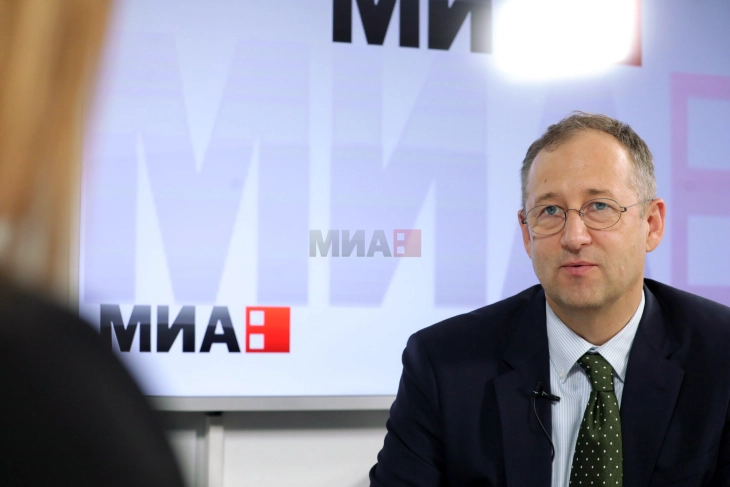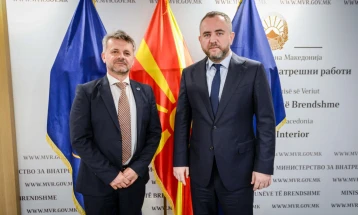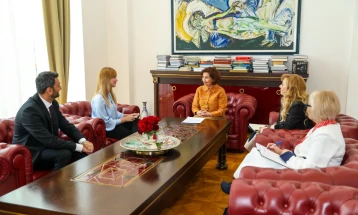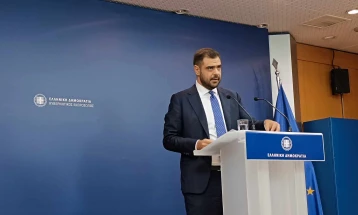Despite their importance, bilateral issues should be put aside, otherwise reforms will be affected, says Šatūnas
- Lithuania’s Deputy Foreign Minister Simonas Šatūnas has said that the decoupling of North Macedonia and Albania could be seen as a good argument on how to do more. In an interview with MIA, he says it is not a unique case because his country had also been decoupled from Estonia and Poland, which had started negotiating with the EU earlier than Lithuania, which had prompted his country to make more efforts to catch up.

Skopje, 12 October 2024 (MIA) – Lithuania’s Deputy Foreign Minister Simonas Šatūnas has said that the decoupling of North Macedonia and Albania could be seen as a good argument on how to do more. In an interview with MIA, he says it is not a unique case because his country had also been decoupled from Estonia and Poland, which had started negotiating with the EU earlier than Lithuania, which had prompted his country to make more efforts to catch up.
Even though the Copenhagen criteria should be key in the EU accession process, he says, unfortunately, bilateral issues are present, but they shouldn’t impede the process. Despite the importance of the bilateral issues, according to the Lithuanian minister, they should be left aside from the reform processes, because it might impact the reforms.
“I know that in principle we, Lithuania, are making our decisions on a merit-based process. We believe that accession to the European Union is a merit-based process. We believe that when the countries are doing reforms they need to move as fast as they can. That’s why, on a bilateral basis, we also have a lot of so-called special technical projects, twinning projects, where our institutions are helping your various institutions in various areas, how to do the reforms. But, speaking about the decoupling, I don’t think it’s unique in the history of the accession, because we, in our case, Lithuania as well, when we started negotiations, it was a big group, and we were decoupled as well. Our colleagues in Estonia and Poland they started earlier than we did, then we did a lot of efforts to catch up, and while we were able to catch up, we closed the negotiations at the same time together, and a big group of them are currently member states so we joined in the same year. I would say this decoupling might also be a good argument of how to do more, because in our case we did more, and the decoupling even triggered our reforms, to do them more quickly and more professionally,” Šatūnas tells MIA.

Bilateralization is the reality in the accession process, he notes when asked whether the EU integration process is protected from bilateralization, primarily in relation to issues with history and identity. Lithuania too had had issues with Poland and Latvia. It was a maritime border issue with Latvia and with Poland it was also an issue of minorities, Šatūnas says, but we were always able to agree about it.
“We need to put aside the bilateral issues and we need to focus on the strategic issues.”
“We are definitely not supporting and not favoring bilateralization of the various issues in the accession process, we believe that, even though they are so important, they need to stay aside the process, because then the accession process, or the reforms that you are doing, or other countries are doing, might be put aside by some other issue. So, we are not thinking that’s a good practice, but in our case, we were able to find a way how to deal with our neighbors,” says the Deputy Minister of Lithuania.
Asked whether the proposal of delayed constitutional amendments, that would be enforced once Bulgaria ratified the membership agreement, as a way to avoid the imposing of further vetoes related to identity issues and asked about Lithuania’s stance, Šatūnas, without giving a precise answer, stresses that bilateral issues shouldn’t hinder the process and that it is also important to meet the commitments.

“Like I said before, we really believe that bilateral issues should not overshadow, or impede or slow down the accession process or negotiations process on one hand. On another hand, I think it is important that when the agreements are being made and the commitments are being taken not to stop the process or not to reopen something. The commitments must be implemented because it might create a new reality, or it might create another delay. So, our thinking is, as less bilateral issues as possible, but if the commitments are taken then it’s better to continue with the implementation and move ahead with the process in principle, because that’s the whole idea, how to clear the negotiations process from the various bilateral issues,” says Šatūnas.
Regarding recent remarks by Poland’s Defense Minister Władysław Kosiniak-Kamysz saying that Warsaw would block Ukraine’s EU accession until Kyiv allows the exhuming of the victims of the Volyn massacre in World War II, the Lithuanian diplomats says he is aware that it is difficult to put aside big and difficult historical issues.
“But still we encourage [candidates] to go on the bilateral dialogue track, like we did in our history, and then try to continue moving with the accession process and try to use the momentum. Because now it’s a momentum when Ukraine and Moldova and Western Balkan countries have the proper attention in the European Union. As you see, President von der Leyen and many member states are putting the enlargement process on top. So, we believe that this really is a historic opportunity, it’s a historic window like it was in our history 20 years ago. It’s really 20 years ago, this year we are celebrating 20 years of membership in the EU. So, we think difficult questions have to be left for bilateral dialogue. Let’s encourage bilateral dialogue but on another front let’s move with the reforms that are necessary for the enlargement,” says Šatūnas.

In the MIA interview, he also talks about the opening of the Skopje office of the Lithuanian embassy, the country’s first diplomatic mission in Western Balkan countries. We, he says, want to strengthen the presence in the Western Balkans especially seeing North Macedonia implementing reforms paving the way toward opening of accession talks for EU membership.
Lithuania on its EU accession path had to concede on some hard issues, including the closing of a nuclear power plant, built during the Soviet era, which had produced 70-90 percent of electricity for Lithuania while also supplying Latvia, Kaliningrad and Belarus, and the abolishment of the death penalty.
On the fight against corruption, Deputy Minister Šatūnas says it is an imperative in the accession process, stressing its success depends the most on political will and dedication.
Bilateral relations between North Macedonia and Lithuania, he notes, are excellent with 2025 marking the 30th anniversary of the establishment of diplomatic ties.

Watch the interview with Lithuania’s Deputy Foreign Minister Simonas Šatūnas in full below.
Interviewer: Ana Cvetkovska
Photo: Frosina Naskovikj
Video and editing: Asllan Vishko and Vladimir Rabasovikj







